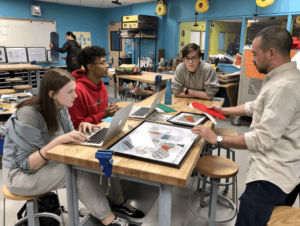Don't lock the doors to virtual schools
Read the following important post from Patrick Donaldson about limitations being proposed on online learning in Oregon. Similar efforts to limit opportunity by placing enrollment caps or geographic boundaries around online learning are underway across the country. These barriers will slow the development of a new generation of flexible options that will serve many students well.
While President Barack Obama is advocating for innovation in our schools, teachers unions and the Oregon Senate are threatening to put a halt to high-quality virtual charter schools through Senate Bill 767.
Although online schools are not for everyone, a small percentage of students thrive through online learning as opposed to traditional brick-and-mortar schools.
It may be because of serious illness, the need to work to support a family, disabilities, problems with socialization or any of myriad other reasons, but virtual education is the solution for many students when traditional schools are not effective for them.
For those students who need and can succeed in a flexible, individualized virtual public education program, we need to ensure that they and their families have access to quality teaching and learning materials in an online setting.
Kaplan Academy of Oregon is a virtual public charter school operated by an Oregon nonprofit in partnership with the Reynolds School District. It opened in February after 18 months of study, work and preparation. It now has a limited enrollment of 30 students, half from within the district and half from outside the district.
But more than 150 students have been turned away from enrolling in the school solely because they live elsewhere in the state. That’s because Oregon now requires at least 50 percent of the students enrolled in a virtual charter school to live in the authorizing district unless a waiver is obtained from the Oregon Board of Education.
SB767 would prohibit any waiver of this 50 percent rule and would drastically restrict enrollment unless the Legislature changes the law in the future.
Make no mistake, Kaplan Academy of Oregon supports legislation that would set high standards and performance requirements for virtual charter schools as well as requiring funding transparency and accountability. But we oppose legislation that would severely limit virtual education in Oregon.
During this time of economic crisis, the teachers unions have committed huge amounts of time and finite legislative resources to push for SB767, which would impact less than 1 percent of all Oregon students. Virtual schools allow these children to succeed when they might otherwise fail.
Passage of SB767 would lock the virtual schoolhouse doors to those who need access to this innovative, efficient and effective education option.
Patrick Donaldson of Northeast Portland is president of Oregon Virtual Education Partners.








0 Comments
Leave a Comment
Your email address will not be published. All fields are required.